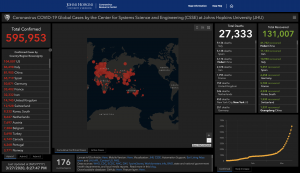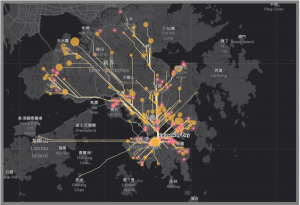Data Ethics in the Face of a Global Pandemic
By Natalie Wang | March 27, 2020
Since the first recorded case of Covid-19 four months ago, there have been more than 500,000 reported cases worldwide. Every day thousands of new cases of this infectious disease are being reported. Early studies show it affects people of all ages (although it appears to be particularly fatal in the elderly population) and is most often transmitted through contact with infected people. Due to its highly infectious nature, many countries have implemented international travel restrictions. Additionally, in the United States, as of March 24, more than 167 million people in 17 states, 18 counties, and 10 cities have received shelter-in-place orders from their state officials. The government is also attempting to head off the spread of Covid-19 with data.

Source: https://coronavirus.jhu.edu/map.html
As a disease progresses, there are different ways data can be used for public good. In the beginning of a spread, it is useful for public health officials to know some private information about the infected individuals. For example, where exactly they have been and who they have been in contact with. This can help determine how the virus was transmitted and who to warn to be on the lookout for early symptoms. Other demographic and health data may also provide clues about which populations will be particularly susceptible to the virus. However, while this data is extremely useful to public health officials especially in the beginning when a disease is more unknown, it does not mean it is useful or should be made available to the public. Personal privacy and risks associated with health data still need to be taken into account when sharing this kind of data. For example, knowing the names of the individuals with the first cases of Covid-19 would not help you protect yourself any better against the virus.
Once a disease is spread around a community, knowing specific personal information may not be as useful because an individual could have picked up the virus from many places. At this point, to prevent further spread of Covid-19, it may be useful to know where collective groups of people are gathering and general transportation patterns. Currently, Facebook, Google, and some other tech companies are discussing potentially sharing aggregated and anonymized user location data with the US government to analyze how effective social distancing measures are and how transportation patterns might be affecting the spread of Covid-19. From the general sentiment on Twitter, people are extremely unhappy with this idea. The main argument being that providing the government with increased data now will lead to further erosion of privacy down the line.

Source: https://www.wired.com/story/value-ethics-using-phone-data-monitor-covid-19/
To limit the privacy risk this additional digital surveillance will have on the population, tech companies should only collect and provide data that is needed and will lead to valuable insights on Covid-19. Obviously this is easier said than done, how do we know how much data is enough? Or what will be useful? The best way to address this would be to consult with multiple experts from different fields and to keep users informed during the process. In my opinion, Covid-19 is too important of an issue to not attempt to use all the resources we have. During public health emergencies, people cannot have the same level of personal privacy they have at other times. However, there should still be safeguards in place to protect a reasonable amount of privacy while also furthering public health.
As Al Gidari, the director of privacy at Stanford’s Law School tweeted, “The balance between privacy and pandemic policy is a delicate one… Technology can save lives, but if the implementation unreasonably threatens privacy, more lives may be at risk.” As a society, we are in a situation we have never been in before; Covid-19 is a dangerous global pandemic that needs to be addressed with all the technology we have. However, because the potential for misuse of personal data is so high, there needs to be more transparency between what data is being shared and how it is being used. Additionally, people should be careful and stay informed about what is going on.
Sources:
https://www.cdc.gov/coronavirus/2019-ncov/prepare/transmission.html
https://www.nytimes.com/interactive/2020/us/coronavirus-stay-at-home-order.html
https://www.theverge.com/2020/3/12/21177129/personal-privacy-pandemic-ethics-public-health-coronavirus
https://www.wired.com/story/value-ethics-using-phone-data-monitor-covid-19/
https://www.washingtonpost.com/technology/2020/03/17/white-house-location-data-coronavirus/
